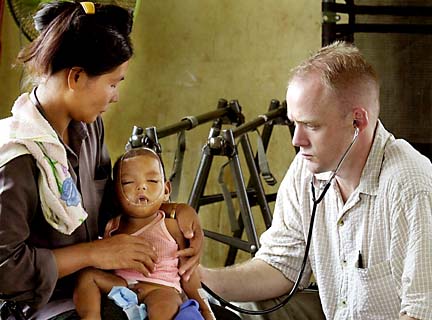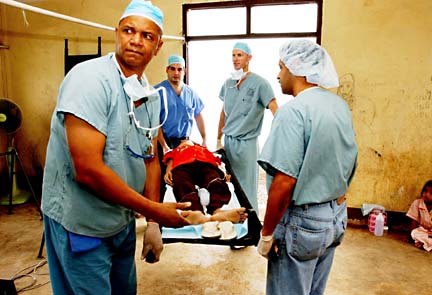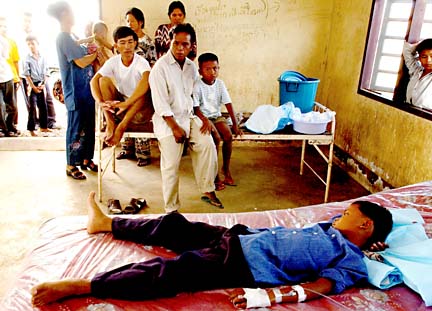
ASSOCIATED PRESS
Cambodia land-mine victim Hem Sophal is examined by U.S. Army Sgt. Roger Erismann at a rural hospital in Pailin, Cambodia.
Learning
by healingTripler soldiers help land-mine
victims in Cambodia
PAILIN, Cambodia >> Not all soldiers make war, though Cambodians could be excused for thinking so as they recover from three decades of armies inflicting misery on them.
The family of Hem Sophal learned soldiers can be healers, too. U.S. military doctors on temporary duty in northwestern Cambodia patched up the 23-year-old farmer after his hand was nearly blown off when his hoe struck a land mine.
When his family rushed the young man with mangled hand, cracked ribs and punctured lung six miles by truck over dirt tracks to the hospital in Pailin, they did not even know that a mobile surgery team from Tripler Army Medical Center in Hawaii was there.
The Americans had come for a two-week training mission and had set up two mobile operating theaters -- air-conditioned, high-tech tents -- next to the run-down municipal hospital surrounded by grazing cattle and scavenging goats.
Not many members of the U.S. military have spent much time in Pailin, a town near Cambodia's western border with Thailand. It was a stronghold of communist Khmer Rouge rebels until seven years ago.
Pailin was chosen for the mission because it is in a part of Cambodia littered with land mines and unexploded ordnance from more than 30 years of war and unrest, making it a laboratory for the treatment of battlefield injuries.
ASSOCIATED PRESS
1st Lt. Jack Strong checks on the progress of a young Cambodian boy following surgery to repair a hernia.
"It's a training mission for us to handle blast trauma," said Lt. Col. Dallas Homas, a reconstruction and plastic surgeon from the Cleveland area who led the 17-soldier team from the U.S. Army's Pacific Regional Medical Command. "There's also a humanitarian aspect: bringing first-class surgery to people who normally wouldn't have access to it."
When Hem Sophal was brought in, the American medical team worked quickly, draining his lung to stabilize his condition.
Then Maj. John Faillace, from Huntsville, Texas, and Maj. Mark Pallis, of Branchville, N.J., got to work on rebuilding his hand. Though the thumb could not be saved, Hem Sophal is expected to have almost normal use of the four remaining fingers.
Had he not been able to get that First World treatment, Hem Sophal's hand likely would have been amputated, and his breathing complications might have killed him, Cambodian and U.S. doctors agreed.
"I was very happy to see foreign doctors," Hem Sophal said while sweating in bed in a recovery room crowded with patients, their families, cooking stoves, flies and mosquitoes. "I am lucky."
ASSOCIATED PRESS
Maj. Carlo Tutt, left, and others from a U.S. Army surgical team carry a patient to a recovery ward in Pailin, Cambodia. A team of surgeons and support staff from Tripler Army Medical Center in Hawaii were in Pailin as part of a training mission. Injuries from land mines are still a common problem in Cambodia, especially near Pailin, where many former Khmer Rouge soldiers have settled.
Cambodia's health care system was devastated by years of war and neglect, and the government lacks the resources for improvements. The country also has a shortage of trained medical personnel, a legacy of most doctors being killed, as were many other educated people, during the radical rule of the Khmer Rouge in the late 1970s.
Pailin's hospital -- comprising several one-story, open-air concrete buildings -- lacks running water and steady electricity. Although well stocked with supplies and medicines, it is short of equipment and adequately trained personnel.
"Taking all into consideration, this is the worst hospital I've worked in," said Homas, who also has worked in grim conditions in such places as the Palestinian territories and Honduras.
Radio announcements about the Americans doing free surgery attracted patients from more than 65 miles away, some crossing jungles and scaling mountain paths.
Almost every day during the team's two-week stay, dozens of families lined up before dawn. Capt. Kent DeZee, a specialist in internal medicine from McDonald, Ohio, painstakingly evaluated prospective patients, some 360 men, women and children in all. Doctors had to turn away dozens, lacking the time or the supplies to treat them.
ASSOCIATED PRESS
A Cambodian family looks on while visiting recovering patients at a poor rural hospital.
Homas' squad, which included five surgeons, two other doctors, physical therapists, operating room technicians, nurses and support staff, operated on 84 Cambodians, sometimes working past midnight.
More than a dozen people were treated for traumatic injuries, including six from explosions, two from chemical burns and several from motorbike accidents, DeZee said.
Most of the other people operated on suffered from goiters, cleft lips, hernias and polio-related orthopedic disorders -- ailments common in poor, rural areas in the tropics.
Doctors also dug out pieces of shrapnel that had been embedded for years in several old soldiers' bodies, and improved the appearance of nasty scars. A man struck in the face with an ax years ago had his nose and upper lip reconstructed.
Mup Sophoan, 26, lost his right hand and took shrapnel in the face and chest when a land mine exploded in February while he was clearing land of branches and shrubs so he and his brother could plant soybeans and corn.
He said the traditional, hand-painted "magic" tattoos that covered much of his body were designed to ward off evil spirits in fields, forests and jungles. They had protected him for seven years, and he did not know why "the power is now gone."
"This is an amazing experience for our team because they're seeing injuries, wounds, diseases that they've before mostly only read about in books," Homas said. "We simply almost never see many of these problems back at home."
Tripler Army Medical Center
World Health Organization



